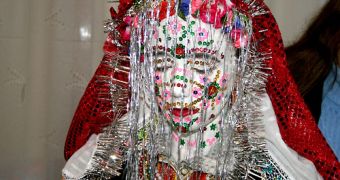This particular tradition is surely a front runner in the top bizarre wedding customs from around the world as the bride is excessively adorned and decorated and marries her groom with her eyes shut. Despite the Communist persecution and many challenges that the villagers of Ribnovo, Bulgaria encountered, they still hold tight to their traditions.
The small village located in the snowy mountains of the Eastern European country has kept the unique winter wedding ceremony for centuries, even if many other villages slowly watched the custom die away with time. The traditional wedding is seen as an answer and reminder of past persecutions that Muslims endured in the area.
The ritual is encountered among the Pomaks, a Slavic population that converted to Islam while under the rule of the Ottoman Empire. Even if the percentage of people who chose to become Muslims was considerably high, they slowly saw their traditions fade away, and only closed societies like the Ribnovo village still perform the special rituals.
This year, the village rejoiced with another traditional celebration and married Bulgarian bride Fatme Inus in the special and unique Ribnovian way. The woman emerged with her face painted and decorated and her eyes tightly closed, presenting herself to the villagers and soon-to-be husband, notes Daily Mail.
The unique winter wedding ceremony highlight mainly revolves around the bride as she greets her groom with her eyes tight shut, with her face covered in thick, white paint and adorned with paper flowers and sequins. The practice wears the name “gelena” and it is only encountered in that small village going back centuries.
The bride's family must prepare an amazing and unique dowry to offer to the groom, holding handmade traditional attire, like quilts, aprons, socks or even carpets and rugs. The ceremony goes on for two days and the entire village participates in the event. Locals who have left for foreign countries, come back to their native village to take part in the wedding and offer their blessing to the newlyweds.
The village of Ribnovo is one of the poorest in Bulgaria and residents have encountered many problems of identity, sometimes outside influences being even rejected. Young people are encouraged to marry inside the small community of 3,500 inhabitants in order to preserve the specific of the closed society.

 14 DAY TRIAL //
14 DAY TRIAL //